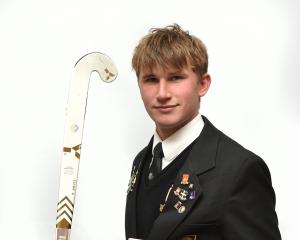
Dunedin’s most vulnerable area to climate change played an unusual role in triggering Class Act 2013 graduate Injy Johnstone’s career.
The Kaikorai Valley College dux and climate researcher, now a research associate in net-zero aligned offsetting at the University of Oxford, had a pivotal moment on a visit to South Dunedin in 2006.
“For me it was getting Al Gore’s An Inconvenient Truth out from United Video there as a 10-year-old. What struck me was the clarity with which he spelt out the issue of climate change and what its impacts could be.
“I had the privilege of attending a lunch with him in 2019 and he was no less convincing now than he was in 2006. His clarity of conviction has stuck with me ever since.”
Johnstone, 27, who is expecting to defend her PhD in international law at Victoria University of Wellington in December, already has a resume which people twice her age would be envious of.
Not only is she researching how the world can reach net-zero emissions, but she also worked on New Zealand’s Zero Carbon Bill at the Ministry for the Environment and has been involved with United Nations programmes for children and youth, and for sustainable development.
Late last year, she attended the global climate change conference COP27 in Egypt, calling New Zealand’s lack of ambition on cutting agricultural emissions “embarrassing” in a Newsroom article.
Johnstone’s non-governmental organisation experience has included founding the Foster Child Support Network - she was the first foster child in Aotearoa to receive a Fulbright Scholarship, which she used to study for her master’s of laws in environment, energy and natural resources at the University of Colorado, Boulder - as well as being former vice-chairwoman of the Endangered Species Foundation in New Zealand and national administrator for Generation Zero.
With her bulging curriculum vitae, Johnstone lives a busy life. She subscribes to Parkinson’s Law, in which work expands to fill the available time.
“Don’t get me wrong, it has been hectic. But I have found that time is relative.
“I’m fortunate I get to do many things I enjoy through paid or voluntary work, and they align with things I enjoy generally, such as collaborating with friends on voluntary projects or travelling. As I’m getting older, I am trying to carve out more non-working hours to spend time with loved ones, try out new hobbies and recharge.”
New Zealand’s favourite method of offsetting emissions, planting trees, is a lazy way of dealing with the problem, she says.
“Tree-planting is one tool of many in the tool-belt, but is often viewed as the easiest thing.
“If done right, it can help with mitigation, adaptation and biodiversity efforts. However, if done wrong - for example, by not planting native trees - it can put all those same things at risk.
“Companies need to be investing in emissions reductions within their supply chain first and foremostly before considering any form of offsets - whether tree-planting or the newer forms of carbon removal available like biochar and direct air capture.”
Johnstone realises the enormity of the challenges ahead for humanity, as we try to limit the global temperature increase this century to below 2°C, - preferably 1.5°C or lower - above pre-industrial levels.
So, what is her biggest worry as she approaches her 30s?
“What it means to start a family against a backdrop of the existential risks we face, from climate change to AI.”












